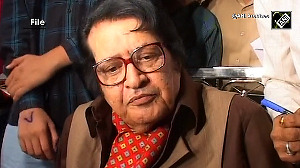
Once dubbed the “reluctant prince”, Rahul Gandhi on Saturday took over the reins of the Congress, signalling not just the coming of age of the heir apparent, but a generational change in the 132-year-old party.
The new party president, the sixth member of the Nehru-Gandhi family to lead the political outfit, takes charge from his mother Sonia Gandhi at a time when the party is facing one of its worst crises, with the Bharatiya Janata Party occupying the centre stage of national and state politics.
But the 47-year-old Amethi MP, formally elevated to the party president’s post on Saturday, has taken the Narendra Modi government on with a renewed vigour of late.
Observers believe his demeanour has changed in the last few months. Dressed in his white kurta and pyjamas, wearing sneakers and a jacket in winter, he looks more mature and speaks a language that connects with the people.
He has been taking potshots at the Modi government on Twitter, often using colourful and popular cultural idioms.
The Gandhi scion has described the Goods and Services Tax as the “Gabbar Singh Tax”, called the government a “suit-boot ki Sarkar”, referred to a “fair and lovely tax” and even brought in his dog, Piddi, to score political brownie points.
Though it has often been said that he lacks the charisma of his mother and grandmother, or the ease with which his younger sister, Priyanka, reaches out to people, Gandhi has seemingly found his feet and confidence.
For the younger leaders of the party, he spells hope in the current political maelstrom, but Gandhi has also said he will take the old guard, along with the new.
“Every post comes with a challenge. He has to rebuild the party at the grassroots and strengthen its ideological base,” said Sushmita Dev, a close confidant of Rahul Gandhi and one of the young leaders of the party.
The 17th Congress president since Independence was ushered to the centre stage of politics when he won from Amethi in Uttar Pradesh in 2004, a seat which was represented by his father Rajiv Gandhi and mother Sonia Gandhi in the Lok Sabha earlier, and made his first mark in Parliament when he spoke passionately about Vidarbha farm widow Kalavati.
For, while politics may or may not have been his calling, it is certainly in his blood.
Starting from his great-great grandfather Motilal Nehru, the Congress has been tightly held by his ancestors, including great grandfather Jawaharlal Nehru, grandmother Indira Gandhi, father Rajiv Gandhi and mother Sonia Gandhi, who steered the party for a record 19 years in a row.
The party had made Rahul Gandhi its general secretary in 2007 and vice-president in 2013. His easy elevation was not surprising, given the tacit understanding within the party that the mantle must pass from one Gandhi to another.
In the early years, it had seemed that the man who had seen the assassination of his grandmother as a teenager and that of his father as a young adult, wanted to steer clear of the murky world of politics.
Gandhi, who went to St Stephen’s College in Delhi, Rollins College in Florida and Trinity College, Cambridge, joined the Monitor Group, a consulting group in London, where he worked for three years.
But after that, it had to be back home, to the political role carved out for him.
His leadership in elections has so far been dismal. Since he became the Congress vice president in 2013, the party has lost power in state after state and is left with only five currently.
But Congress leaders hope he would draw the party out of quagmire and onward to success.
“I see hope and confidence in Rahul,” said Punjab Chief Minister Amarinder Singh, who was his father’s friend.
The “Reluctant Prince” -- as he was dubbed by sections of the media -- is now seemingly raring to go.
Congressmen refer to his address to the students in Berkley, US, when he boldly took questions, even on dynastic politics, to underline his new-found confidence.
The BJP has also started taking Rahul Gandhi seriously of late, often fielding a host of ministers to counter the Congress leader, who started tweeting a question every day to Modi, quizzing him on a wide range of subjects, in the run-up to the recent assembly polls.
His first litmus test is Gujarat and it has to be seen if his hard work in steering the party’s vigorous campaign will pay off.
Though exit polls predict a victory for the BJP in Gujarat and Himachal Pradesh, top Congress leaders feel if their party wins or significantly improves its position in Gujarat, Rahul Gandhi’s leadership will be established.
A party leader said Rahul Gandhi’s next challenge would be to cobble together electoral alliances.
He would have to handle the rough and tumble of 24X7 politics and take on aggressive rivals such as Modi and BJP president Amit Shah.
“The Congress has a presence across the country. Rahul will have to revive the party and shake it up, with the correct people for the correct places,” senior Congress leader Kishore Chandra Deo said.
If he could do well in Gujarat, Deo said, he could do so in any other state.
Photograph: Amit Dave/Reuters











 © 2025
© 2025